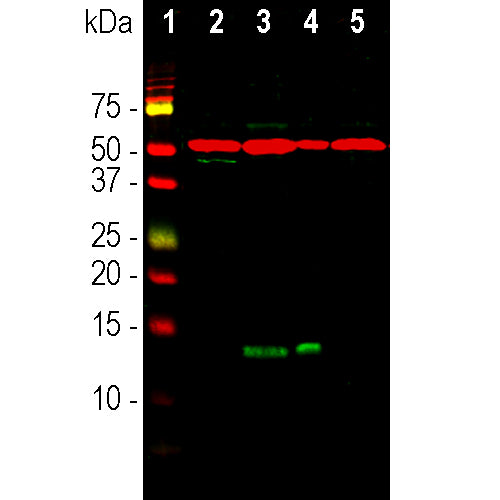
EnCor Biotechnology
Rabbit Polyclonal Antibody to Fatty Acid Binding Protein 7 (FABP7), Cat# RPCA-FABP7
Description
The RPCA-FABP7 antibody was made against full length recombinant human FABP7 protein expressed in and purified from E. coli. It is useful for studying neural stem cells, developing astrocytes and radial glia under normal and pathological conditions and neural cell progenitors in adult brain. We also supply a mouse monoclonal antibody made against the same immunogen, MCA-2A84.
- Cell Structure Marker
- Cell Type Marker
- Immunohistochemistry Verified
- Pathology Related Marker
- Rabbit Polyclonal Antibodies
Add a short description for this tabbed section
| Immunogen: | Recombinant full length human FABP7 expressed in and purified from E. coli. |
| HGNC Name: | FABP7 |
| UniProt: | O15540 |
| Molecular Weight: | 14kDa |
| Host: | Rabbit |
| Species Cross-Reactivity: | Human, rat, mouse |
| RRID: | AB_2737420 |
| Format: | Immunogen affinity purified antibody at 1mg/mL in 50% PBS, 50% glycerol plus 5mM NaN3 |
| Applications: | WB, IF/ICC |
| Recommended Dilutions: | WB: 1:1,000-2,000. ICC/IF 1:1,000-2,000. |
| Storage: | Store at 4°C for short term, for longer term store at -20°C. Stable for 12 months from date of receipt. |
Fatty Acid-Binding Proteins (FABPs) are a family of low-molecular-weight (14–15kDa) intracellular polypeptides that bind and solubilize long-chain fatty acids, thus controlling intracellular lipid dynamics (1,2). Ten members of the FABP family are expressed in humans, each with a specific cell and tissue expression pattern. The seventh member of the family is generally called FABP7 but is also known as brain lipid binding protein or BLBP. One group discovered a cDNA the corresponding mRNA for which was specifically expressed in the brain in large amounts only early in development and which was clearly related in amino acid sequence to other lipid binding proteins known at the time (2). FABP7 is abundantly expressed in neural stem cells, radial glia and astrocytes of the developing brain and the retina but is heavily down regulated in the adult. Different members of the FABP family bind different lipid ligands and FABP7 appears to bind with very high affinity a polyunsaturated fatty acid (PUFA), specifically the omega 3 lipid docosahexaenoic acid (DHA, 3). DHA is the major PUFA of the human brain the nutritional requirement for this PUFA parallels the expression profile of FABP7. FABP7 expression is regulated downstream of PAX6 and Notch signalling pathways and higher expression of FABP7 are associated with a worse prognosis in patients with glioblastoma multiforme (5). Genetic deletion of the FAPB7 gene is not lethal, but mice lacking the protein product have behavioral abnormalities including increased anxiety (6). FABP7 is expressed in both the nuclei and cytoplasm of cells in which it is expressed and some evidence suggests it may also be secreted, functioning as a developmentally important ligand important for neuronal migration along radial glia (2).
1. Gordon JI, et al. Intracellular fatty-acid-binding proteins and their genes: useful models for diverse biological questions. Curr. Opin. Lipidology 2:125-137 (1991).
2. Hertzel AV, Bernlohr D. The mammalian fatty acid-binding protein multigene family: molecular and genetic insights into function. Trends Endocrinol. Metab. 11:175-80 (2000).
3. Feng L, Hatten ME, Heintz N. Brain Lipid-Binding Protein (BLBP): A Novel Signaling System in the Developing Mammalian CNS. Neuron 12:895-908 (1994).
4. Xu LZ, et al. Ligand specificity of brain lipid-binding protein. J. Biol. Chem. 271:24711-9 (1996).
5. Liang Y, et al. Gene expression profiling reveals molecularly and clinically distinct subtypes of glioblastoma multiforme. PNAS 102:5814-9 (2005).
6. Owada Y, et al. Altered emotional behavioral responses in mice lacking brain-type fatty acid-binding protein gene. Eur. J. Neurosci. 24:175-87 (2005).
Add a short description for this tabbed section





